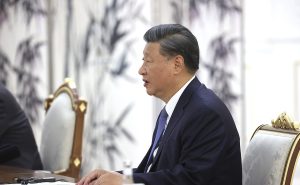Rumors have been swirling ahead of the Chinese Communist Party’s 20th National Congress, now just one month away. Outgoing Premier Li Keqiang could succeed Xi Jinping as CCP general secretary, claimed a report in late August by Taiwan’s United Daily. Soon after, some commentators claimed that Xi is losing support among party elders, including three party veterans who wrote a letter warning against personality cults and power centralization.
Meanwhile, there were renewed signs of a split between China’s top two leaders following the purported Beidaihe retreat last month. Xi travelled to Liaoning province, a symbol of China’s former planned economy, whereas Li travelled to Shenzhen, the cradle of Chinese market reforms. That same week, Li and protégé Vice Premier Hu Chunhua were prominently featured by state media, while references to an important pro-Xi slogan – the “Two Establishes” – decreased slightly.
These tealeaves suggest, perhaps surprisingly, that there is still room for contending views and figures in this strongman era of Chinese elite politics. Yet we should stop short of concluding that Xi Jinping’s grip on power may now be threatened by factional rivals like Li and Hu.
Li has already confirmed that he will resign as premier, a role that has been weakened by Xi and entities under his control. And while Li’s age permits him to remain on the CCP’s seven-member Politburo Standing Committee, this would likely involve a demotion to a lower-ranking position, not a promotion to general secretary. If Hu were appointed premier, it would not necessarily mean that Xi has been challenged, but may simply reflect Hu’s experience and acceptability within the party.
Importantly, Xi continues to dominate state media coverage; he was the only senior leader mentioned on China’s official evening news broadcast during the first half of August, when the Beidaihe conclave likely occurred. The “Two Establishes” slogan, aimed at justifying why Xi should stay in power, was revived by early September. And former Hubei party chief Ying Yong became the latest Xi ally to be positioned for a leading post-Congress role, probably as chief prosecutor.
Xi’s supremacy was further underscored by the announcement of the upcoming Congress, which restated his signature policy ideas of “common prosperity” and national rejuvenation. Xinhua has reported that the CCP constitution will again be amended at this year’s Congress, and veteran China watcher Bill Bishop expects that the amendment will further enshrine Xi’s ideology. Xi could even be adorned with the honorific title of lingxiu that has previously only been bestowed upon Mao Zedong.
For all of these reasons, any rumors of challenges to Xi’s power should be treated with skepticism, especially since such rumors may be manufactured by certain factions or interest groups. At the same time, the apparent certainty of Xi’s reselection belies a backdrop of domestic and international challenges that China’s leader would rather have avoided this congress year.
On the geopolitical front, China’s tacit support of Russia’s invasion of Ukraine has left Xi in an awkward position. Initial signals from his meeting with Vladimir Putin suggest that their “no limits” partnership remains intact, despite Xi expressing concerns over the faltering war effort. Alarmed by the West’s coordinated use of sanctions on Moscow, Beijing has sought to accelerate self-sufficiency efforts in critical areas such as energy, technology, and food.
Those efforts, though, have been made difficult by a series of extreme climatic events affecting many Chinese regions this summer. From June, a record-breaking heatwave affected much of southern and eastern China, causing severe drought along the Yangtze River. Parts of western China saw flash floods after receiving twice the average rainfall for July. To make matters worse, Sichuan and Chongqing suffered wildfires in late August and a strong earthquake in early September.
This summer of bad weather has been an unwelcome distraction for Beijing, particularly the heatwave. It has caused energy shortages, disrupted river-based logistics, hit industrial production, and lowered agricultural yields. China may now need to increase imports of key commodities, despite Xi’s call for Chinese people to “hold their rice bowls firmly in their own hands.”
Inclement weather has only exacerbated existing economic challenges. Of particular concern is the ongoing liquidity crisis affecting the real estate sector. In July, there were protests in cities including Zhengzhou, where homeowners had withheld mortgage payments on unfinished properties. To help alleviate the crisis, local governments have resorted to relaxing controls on property transactions, with some regional authorities now buying up land to bail out cash-strapped cities and provinces.
The other major headwind for China’s economy is Xi’s zero-COVID strategy. As of early September, 33 Chinese cities (or 65 million people) were in some form of lockdown, Caixin estimated. But the lessons of Shanghai’s lockdown were clearly not learned, as residents from Xinjiang to Sichuan have reportedly suffered from food shortages and been denied timely hospital care.
Social and economic impacts aside, could this year of plagues and tempests also be a bad political omen? In traditional Chinese culture, natural disasters are inauspicious, and are believed to portend a loss of the ruler’s legitimacy or “mandate of heaven.” In July 1976, the devastating Tangshan earthquake struck only six weeks before the death of Mao, causing at least 300,000 casualties.
An event of this magnitude is yet to befall Xi Jinping, who appears to be weathering the current international and domestic storms. No war, lockdown, or climatic event has so far incurred a human or economic cost that could seriously threaten Xi’s continuation in power. But China’s president is no doubt keen to avoid any further crises, natural or manmade, during the final lead-in to the Congress.













